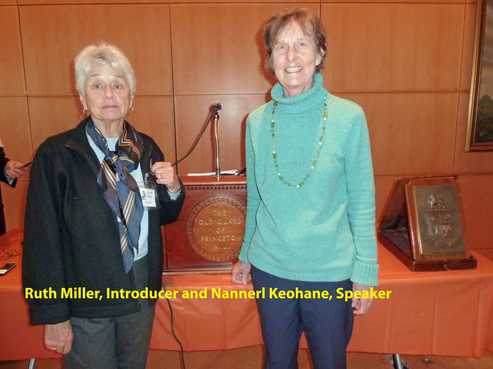November 30, 2011
The Many Faces of Leadership
Nannerl Keohane
Laurence S. Rockefeller Distinguished Visiting Professor of Public Affairs and the University Center for Human Values
The Many Faces of Leadership
Nannerl Keohane
Laurence S. Rockefeller Distinguished Visiting Professor of Public Affairs and the University Center for Human Values
Minutes of the 11th Meeting of the 70th Year
President Bob Varrin called the 11th meeting of the 70th year to order at 10:15. The invocation was led by Don Edwards. Minutes of the November 23rd meeting were read by John Timoney.
Our guests were: Patrick Bernuth, introduced by Nancy Robins, and Joe and Mary Wisnofski, introduced by Landon Jones. Approximately 117 members were present.
Our Speaker, Nannerl Keohane, was introduced by Ruth Miller. Professor Keohane is currently Distinguished Visiting Professor of Public Affairs at the University Center for Human Values. Her topic was, The Many Faces of Leadership.
Professor Keohane received her doctorate in political science from Yale. In 1985, she became president of Wellesley College, and in 1993, she was named president of Duke University. Among her recent and numerous publications is Higher Ground: Ethics and Leadership in Higher Education.
Professor Keohane began her remarks by defining leadership as “determining and clarifying goals for a particular group, then bringing together the members to accomplish those goals.”
While acknowledging the conspicuous, aggressive style of leadership we often associate with corporate CEOs or army generals, Professor Keohane spoke of “quiet leadership,” leading from behind, as Nelson Mandela termed it, in the manner of a shepherd gently keeping his flock together and moving forward.
This less conspicuous leadership, Professor Keohane remarked, is often associated with women. She was part of a Princeton University committee that explored the leadership qualities of the University’s women. The committee found that, traditionally, women students prefer a supporting role, rather than a top position like class president, and they are most interested in working with organizations that contribute significantly to society. However, the reluctance to seek top honors may be changing, as this year, three of Princeton’s four Rhodes Scholars are women, as are four of five Marshall Scholars.
What are the traits or skills of effective leaders? The most important general quality is good judgment. Some others are:
Another questioner asked how leaders can maintain humility, a sense of their own fallibility. Professor Keohane suggested that a leader should, above all, try to keep a sense of humor, including an ability to be amused at oneself. She also urged that a leader’s family and friends have an obligation to speak truth to power, and a wise leader will listen.
Respectfully submitted,
James R. Deneen
Our guests were: Patrick Bernuth, introduced by Nancy Robins, and Joe and Mary Wisnofski, introduced by Landon Jones. Approximately 117 members were present.
Our Speaker, Nannerl Keohane, was introduced by Ruth Miller. Professor Keohane is currently Distinguished Visiting Professor of Public Affairs at the University Center for Human Values. Her topic was, The Many Faces of Leadership.
Professor Keohane received her doctorate in political science from Yale. In 1985, she became president of Wellesley College, and in 1993, she was named president of Duke University. Among her recent and numerous publications is Higher Ground: Ethics and Leadership in Higher Education.
Professor Keohane began her remarks by defining leadership as “determining and clarifying goals for a particular group, then bringing together the members to accomplish those goals.”
While acknowledging the conspicuous, aggressive style of leadership we often associate with corporate CEOs or army generals, Professor Keohane spoke of “quiet leadership,” leading from behind, as Nelson Mandela termed it, in the manner of a shepherd gently keeping his flock together and moving forward.
This less conspicuous leadership, Professor Keohane remarked, is often associated with women. She was part of a Princeton University committee that explored the leadership qualities of the University’s women. The committee found that, traditionally, women students prefer a supporting role, rather than a top position like class president, and they are most interested in working with organizations that contribute significantly to society. However, the reluctance to seek top honors may be changing, as this year, three of Princeton’s four Rhodes Scholars are women, as are four of five Marshall Scholars.
What are the traits or skills of effective leaders? The most important general quality is good judgment. Some others are:
- Humility – an effective leader can say, “I could learn more.” “I could be wrong.”
- A sense of timing – knowing when a problem is ready for resolution
- Using a variety of sources – not listening only to a few advisors who will agree with one another and with the leader
- Rhetoric – the ability to move an audience: she cited two outstanding examples: Martin Luther King, and Winston Churchill
- An ability to compromise – she referred to the example of Abraham Lincoln and Mahatma Gandhi, two leaders who often achieved their goals through patient negotiation and compromise.
Another questioner asked how leaders can maintain humility, a sense of their own fallibility. Professor Keohane suggested that a leader should, above all, try to keep a sense of humor, including an ability to be amused at oneself. She also urged that a leader’s family and friends have an obligation to speak truth to power, and a wise leader will listen.
Respectfully submitted,
James R. Deneen

